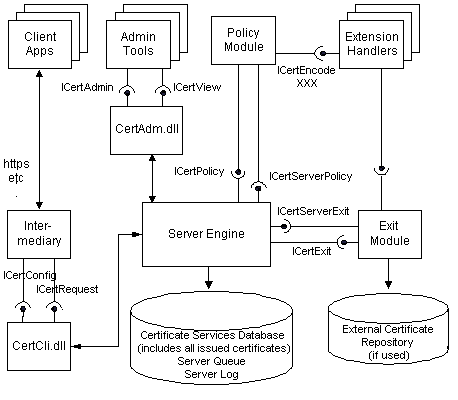Arkitektur för Certifikattjänster
Certificate Services är en utvecklingsplattform för att skapa certifikatutfärdare för företag eller säkra Internetprogram. En konfigurerad och driftscertifikatutfärdare gör det möjligt för en plats att utfärda, spåra, hantera och återkalla certifikat med minimal administrationskostnad och maximal säkerhet.
Certifikattjänsterna består av servermotorn, serverdatabasen och en uppsättning moduler och verktyg som fungerar tillsammans för att fungera som certifikatutfärdare. Externa program, moduler och administrationsverktyg använder COM-gränssnitt (Component Object Model) för att interagera med servermotorn. Följande diagram visar de gränssnitt som används av servermotorn:

Ett driftcertifieringssystem har vanligtvis fyra större undersystem.
| Delsystem | Beskrivning |
|---|---|
| Klient | Klienten är den programvara som används av slutanvändaren för att generera en certifikatbegäran, skicka begäran och ta emot det färdiga certifikatet. Ett exempel på en klient är Microsoft Internet Explorer version 5. Klienten interagerar vanligtvis med ett anpassat gränssnitt som underhålls av mellanhandsprogrammet. |
| Mellanhand | Mellanhanden är ett undersystem som består av mellanhandsprogrammet och klientgränssnittet för Certifikattjänster (Certificate Services-webbklienten i installationsprogrammet). Mellanliggande program interagerar direkt med klienten, tar emot certifikatbegäranden och returnerar färdiga certifikat. Den kommunicerar med servermotorn via certifikattjänstens klientgränssnitt, som innehåller ICertConfig- och ICertRequest COM-gränssnitt. Ett exempel på ett mellanliggande program är Microsoft Internet Information Services. Mellanliggande program kan implementeras helt och hållet via Aktiva serversidor. |
| Server | Servern är det system som skapar certifikatet. Förutom servermotorn ingår två konfigurerbara komponenter. principmodulen och avslutningsmodulen. Principmodulen interagerar med servermotorn via gränssnitten ICertPolicy och ICertServerPolicy. Avslutningsmoduler (det kan finnas fler än en) interagerar med servermotorn via ICertExit- och ICertServerExit--gränssnitt. |
| Administrativ klient | Den administrativa klienten är det system som övervakar och hanterar certifikat och begäranden. Den administrativa klienten använder gränssnittet ICertAdmin för att kommunicera med servermotorn. |
Mer information om Certifikattjänsters arkitektur finns i Kryptografigränssnitt, Skapa ett certifikatoch följande avsnitt.
| Sektion | Innehåll |
|---|---|
| principmoduler | Anpassningsbara program som kan användas under utvärderingen av certifikatbegäranden; dessa program framtvingar de regler som Certifikattjänster utfärdar eller nekar begäran. |
| avsluta moduler | Anpassningsbara program som tar emot meddelanden från servermotorn när åtgärder utförs, till exempel när ett certifikat utfärdas. |
| tilläggshanterare | COM-objekt som tillhandahåller rutiner för att koda de mer komplexa tilläggen och datatyperna. |
| mellanhänder | Program som kommunicerar med klientprogram för att tillåta sändning av certifikatbegäranden. |